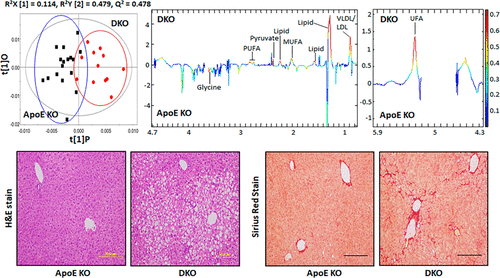当前位置:
X-MOL 学术
›
J. Proteome Res.
›
论文详情
Our official English website, www.x-mol.net, welcomes your feedback! (Note: you will need to create a separate account there.)
Ron Receptor Signaling Ameliorates Hepatic Fibrosis in a Diet-Induced Nonalcoholic Steatohepatitis Mouse Model
Journal of Proteome Research ( IF 4.4 ) Pub Date : 2018-08-23 , DOI: 10.1021/acs.jproteome.8b00379 Joselyn Allen 1 , Jingtao Zhang 1 , Michael D. Quickel 1 , Mary Kennett 1 , Andrew D. Patterson 1 , Pamela A. Hankey-Giblin 1
Journal of Proteome Research ( IF 4.4 ) Pub Date : 2018-08-23 , DOI: 10.1021/acs.jproteome.8b00379 Joselyn Allen 1 , Jingtao Zhang 1 , Michael D. Quickel 1 , Mary Kennett 1 , Andrew D. Patterson 1 , Pamela A. Hankey-Giblin 1
Affiliation

|
Liver fibrosis is commonly observed in the terminal stages of nonalcoholic steatohepatitis (NASH) and with no specific and effective antifibrotic therapies available, this disease is a major global health burden. The MSP/Ron receptor axis has been shown to have anti-inflammatory properties in a number of mouse models, due at least in part, to its ability to limit pro-inflammatory responses in tissue-resident macrophages and hepatocytes. In this study, we established the role of the Ron receptor in steatohepatitis-induced hepatic fibrosis using Ron ligand domain knockout mice on an apolipoprotein E knockout background (DKO). After 18 weeks of high-fat high-cholesterol feeding, loss of Ron activation resulted in exacerbated NASH-associated steatosis which is precedent to hepatocellular injury, inflammation and fibrosis. 1H nuclear magnetic resonance (NMR)-based metabolomics identified significant changes in serum metabolites that can modulate the intrahepatic lipid pool in hepatic steatosis. Serum from DKO mice had higher concentrations of lipids, VLDL/LDL and pyruvate, whereas glycine levels were reduced. Parallel to the aggravated steatohepatitis, increased accumulation of collagen, inflammatory immune cells and collagen producing-myofibroblasts were seen in the livers of DKO mice. Gene expression profiling revealed that DKO mice exhibited elevated expression of genes encoding Ron receptor ligand MSP, collagens, ECM remodeling proteins and pro-fibrogenic cytokines in the liver. Our results demonstrate the protective effects of Ron receptor activation on NASH-induced hepatic fibrosis.
中文翻译:

罗恩受体信号改善饮食引起的非酒精性脂肪性肝炎小鼠模型中的肝纤维化。
肝纤维化通常在非酒精性脂肪性肝炎(NASH)的末期观察到,并且由于没有可用的特异性和有效的抗纤维化疗法,这种疾病是全球主要的健康负担。在许多小鼠模型中,MSP / Ron受体轴已显示出抗炎特性,至少部分是由于其限制组织驻留巨噬细胞和肝细胞中促炎反应的能力。在这项研究中,我们在载脂蛋白E基因敲除背景(DKO)上使用Ron配体域敲除小鼠确定了Ron受体在脂肪性肝炎诱导的肝纤维化中的作用。高脂高胆固醇喂养18周后,Ron激活的丧失导致NASH相关的脂肪变性加重,这是肝细胞损伤,炎症和纤维化的先兆。1个基于H核磁共振(NMR)的代谢组学确定了可以调节肝脂肪变性中肝内脂质池的血清代谢物的显着变化。DKO小鼠的血清中脂质,VLDL / LDL和丙酮酸的浓度较高,而甘氨酸水平却降低了。与严重的脂肪性肝炎平行,在DKO小鼠的肝脏中发现胶原蛋白,炎性免疫细胞和产生胶原的成纤维细胞的积累增加。基因表达谱分析表明,DKO小鼠肝脏中编码Ron受体配体MSP,胶原蛋白,ECM重塑蛋白和促纤维化细胞因子的基因表达升高。我们的结果证明了Ron受体激活对NASH诱导的肝纤维化的保护作用。
更新日期:2018-08-23
中文翻译:

罗恩受体信号改善饮食引起的非酒精性脂肪性肝炎小鼠模型中的肝纤维化。
肝纤维化通常在非酒精性脂肪性肝炎(NASH)的末期观察到,并且由于没有可用的特异性和有效的抗纤维化疗法,这种疾病是全球主要的健康负担。在许多小鼠模型中,MSP / Ron受体轴已显示出抗炎特性,至少部分是由于其限制组织驻留巨噬细胞和肝细胞中促炎反应的能力。在这项研究中,我们在载脂蛋白E基因敲除背景(DKO)上使用Ron配体域敲除小鼠确定了Ron受体在脂肪性肝炎诱导的肝纤维化中的作用。高脂高胆固醇喂养18周后,Ron激活的丧失导致NASH相关的脂肪变性加重,这是肝细胞损伤,炎症和纤维化的先兆。1个基于H核磁共振(NMR)的代谢组学确定了可以调节肝脂肪变性中肝内脂质池的血清代谢物的显着变化。DKO小鼠的血清中脂质,VLDL / LDL和丙酮酸的浓度较高,而甘氨酸水平却降低了。与严重的脂肪性肝炎平行,在DKO小鼠的肝脏中发现胶原蛋白,炎性免疫细胞和产生胶原的成纤维细胞的积累增加。基因表达谱分析表明,DKO小鼠肝脏中编码Ron受体配体MSP,胶原蛋白,ECM重塑蛋白和促纤维化细胞因子的基因表达升高。我们的结果证明了Ron受体激活对NASH诱导的肝纤维化的保护作用。



























 京公网安备 11010802027423号
京公网安备 11010802027423号